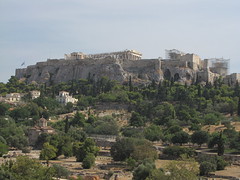Led by Cleisthenes, Athenians established what is generally held as the first democracy in 508-507 BCE. Cleisthenes is referred to as "the father of Athenian democracy," says Wikipedia. [18]
Athenian democracy took the form of a direct democracy, and it had two distinguishing features: the random selection of ordinary citizens to fill the few existing government administrative and judicial offices,[19] and a legislative assembly consisting of all Athenian citizens.[20]
All citizens were eligible to speak and vote in the assembly, which set the laws of the city state. However, Athenian citizenship excluded women, slaves, foreigners (μέτοικοι metoikoi), and males under 20 years old.[citation needed]
Of the estimated 200,000 to 400,000 inhabitants of Athens, there were between 30,000 and 60,000 citizens.[citation needed] The exclusion of large parts of the population from the citizen body is closely related to the ancient understanding of citizenship.
In most of antiquity the benefit of citizenship was tied to the obligation to fight war campaigns.[citation needed]
Athenian democracy was direct also in the sense that the people through the assembly, boule and courts of law controlled the entire political process and a large proportion of citizens were involved constantly in the public business.[
Even though the Roman Republic contributed significantly to certain aspects of democracy, only a minority of Romans were citizens with votes in elections for representatives. The votes of the powerful were given more weight through a system of gerrymandering, so most high officials, including members of the Senate, came from a few wealthy and noble families.[24] However, many notable exceptions did occur.[citation needed]
The word "democracy" combines the elements dêmos, which means "people," and krátos, which means "force" or "power".
Subscribe to:
Post Comments (Atom)





No comments:
Post a Comment